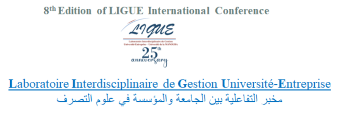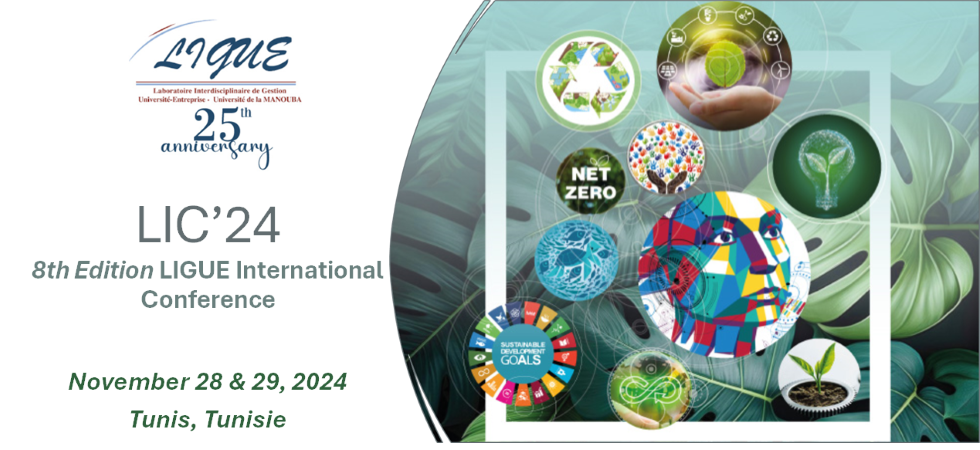Call for papers LIC'24

Plural ecologies : towards a transition of organizations
November 28-29, 2024
Tunis, Tunisia
In its 8th edition, LIC'24 aspires to catalyze research endeavors within the Tunisian, African, and international contexts, building upon ongoing discussions surrounding the following themes and questions (non-exhaustive list):
1- Organizational transition in a plurality of ecologies?
- What governance structures effectively promote sustainable and inclusive economic and technological development (Gumusay et al., 2022)?
- Which economic models best align with the imperatives of sustainability, inclusivity, and circularity (Jesus and Jugend, 2023)?
- What organizational transformations are required to address new challenges such as agility, collective intelligence, the meaning of work, and democratization (Besson et al., 2011)?
- In what ways can an inclusive and circular model catalyze social innovation (Beji-Becheur et al., 2021)?
2- Efficient and rapid transition Enabled by AI?
- How do rapidly evolving technologies and business models raise complex ethical dilemmas, particularly concerning the use of AI (Tremblay et al., 2023) and automated algorithmic decision-making?
- What strategies can be implemented to ensure that digitalization and AI are accessible without perpetuating discrimination or exclusion based on gender, ethnicity, race (UNESCO, 2020), age, geographical location, health status, etc.?
- What are the prerequisites for managing performance effectively, and what impact does digitalization have in complex or crisis scenarios?
- How does the concept of a business ecosystem emerge to delineate the intricate interactions among complementary stakeholders (e.g., companies, startups, customers) within digital platforms (Shen et al., 2024)?
- Is AI a catalyst or impediment to the inclusive development of fintech (Ashta & Herrmann, 2021)?
3– Market transition and Marketing Centered on the Living?
- How can coordination be achieved among interdependent yet independent ecosystem actors, resources, information, processes, and services to (co)create and appropriate the value of market-based enterprise assets (Hewett et al., 2022)?
- In what ways do organizations perpetuate and exacerbate social and economic inequalities, and what are the ramifications for business and marketing strategies (Benschop, 2021)?
- What adaptations are necessary for a marketing approach that places greater emphasis on environmental concerns and technological advancements (Jung & Kim, 2023)?
- What stance should marketing adopt in response to anti-consumption discourse (Dekhili, 2021)? Can consumers challenge big tech corporations (Mhalla, 2024)?
4-Transition of entrepreneurship : between Ecosophy and Ecosystem ?
- How do prevailing notions of entrepreneurship and foundational hypotheses shape the entrepreneurial landscape (Dey et al., 2023)?
- How can new business models integrate inclusive and circular practices (Bocken et al., 2016)?
- What strategies can entrepreneurs employ to achieve a circular economy by optimizing waste utilization and minimizing environmental impact? How can entrepreneurs create opportunities to enhance inclusivity by integrating marginalized populations (Stead & Stead, 2020)?
5- “Accounts” narrative transition: Reporting , disclosure and sustainability
- How do emerging standards such as the Global Reporting Initiative (GRI) and the Sustainability Accounting Standards Board (SASB) influence organizations' approaches to sustainability reporting and disclosure (Pizzi et al., 2023)?
- What challenges do organizations face in implementing sustainability reporting practices, and how do they address legitimacy concerns (Juusola & Srouji, 2023; Mohamed Buallay et al., 2023)?
- How do internal and external audit functions contribute to ensuring the reliability of sustainability information within organizations (Amoako et al., 2023; Asante-Appiah & Lambert, 2023)?
6- Transition in financing: value of information on sustainability
- What roles can standard-setting bodies play in harmonizing sustainability reporting standards (Ali et al., 2023)?
- Why is it imperative to integrate Environmental, Social, and Governance (ESG) considerations into accounting education curricula, and how does this influence professional development (Simmons et al., 2023)?
- How can ESG analyses serve as tools for ethically auditing artificial intelligence systems, and what are the implications for sustainable business practices (Minkkinen et al., 2024)?
|



